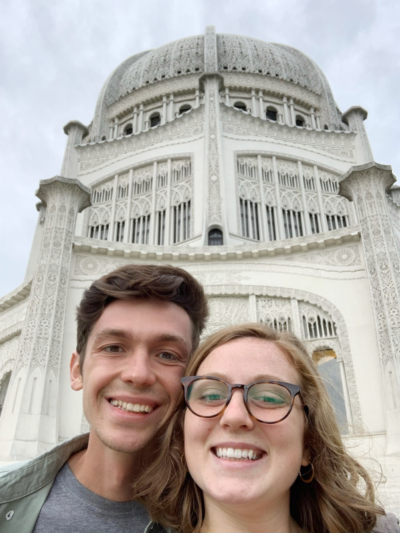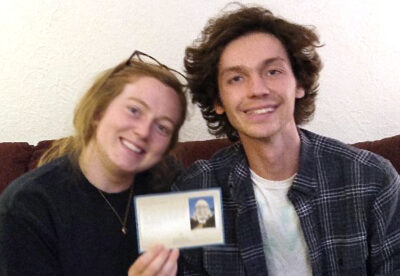One couple’s journey to join the local Bahá’í community
by Marcia Veach, Eugene, Oregon
“[N]aturally, there remains a strong focus on being outward looking and finding ways to continually share the fruits of a thriving pattern of action with souls who are as yet unfamiliar with the Faith.” – the Universal House of Justice*
Tucker Engle’s introduction to the Bahá’í Faith began when he was randomly placed with Andrei Eugenio in a University of Oregon dorm room in the fall of 2017. Andrei, a Bahá’í who had long served as a junior youth animator in his home community in Washington County, was busy with classes, but he didn’t want to give up that service. Eventually, he invited Tucker and Logan, another dormmate, to join him.
“So, we went,” Tucker said, “and it was chaos. 15 middle schoolers running around, not listening, not seeming to be gaining anything from it. Logan and I agreed that this was something we never wanted to do again!”
They were still friends with Andrei and did other fun things together with him and another friend they’d met at the university, Lucas. In their discussions, Andrei would sometimes bring in the Bahá’í perspective.
“I could never get all the names straight, though,” Tucker admitted. “You know, Bahá’u’lláh, Shoghi Effendi. I’d never heard names like that.”

Tucker and Cassidy at the Bahá’í House of Worship in Wilmette, llinois.
Tucker and Cassidy meet
When Tucker was a sophomore, he met Cassidy Kenney (in another seemingly random encounter — but that’s a different story). “I don’t remember hearing about the Bahá’í Faith that autumn,” she said. And then she went off to India for a study-abroad experience. She learned about a lot of different approaches to religion there. One of her journal entries from that time reads, “I need to polish the mirror of my heart.”
Meanwhile, Andrei was spending more time with the Eugene Bahá’í community. During the Fast, he would go off to the home of a local Bahá’í family early in the morning and often didn’t come back for hours. He told his friends that he was having such beautiful, deep talks with Ted and Jeanine Taylor that he hoped they would join him.
Friendships with no strings attached
So, Tucker, Logan and Lucas agreed to go. They loved the discussion—and the home-cooked meal. Ted is a psychologist and Jeanine an educator, and these were both things Tucker was especially interested in. At the end of that first night, he turned to Ted and said, “Oh, I thought we were going to talk about the Bahá’í Faith.”
Ted replied, “Here’s how this is going to work. If you have questions about the Bahá’í Faith, I’ll answer them. But if you don’t have questions, well, I don’t need to talk about it.”
This was such a perfect response. Tucker had been a seeker before and felt pressured to jump into whatever religious group he was investigating. This was something entirely different. And so began a process of Andrei’s friend group increasingly gathering at the Taylors to tell stories and talk about spiritual truths.
Joining service and community-building activities
This eventually led back to the need for junior youth animators and these young men agreed to give it a try. To be an animator, however, they needed to prepare by studying some of the Ruhi courses, beginning with “Reflections on the Life of the Spirit.”
“This seemed like an odd training manual,” Tucker said. “We thought we were just going to learn what kind of games to play.”
By the fall of his junior year, Tucker, along with Logan, Lucas and Cassidy began animating a Junior Youth group. Cassidy brought along some of her friends including her roommate, Lily.
“[I]n areas where such endeavours have been well established for some time, many believers are discovering that a vibrant, expanding pattern of activity can naturally lead to families, groups of friends, and even clusters of households being ready to enter the Cause.” – the Universal House of Justice
These students were now spending 2-3 evenings a week in Bahá’í-centered activities. Unexpectedly, it turned out that they were grateful to meet people in the community who were NOT other college students! Having friends who were closer to the age of their parents and grandparents was comforting.
They also began to attend Bahá’í gatherings where they met other Bahá’ís, especially youth.
They had heard that there was a card to be signed, which would lead to enrollment. “But not signing didn’t exclude us from what we wanted to do at that time. It was clearly up to us to make that decision. We were welcome whether or not we were Bahá’ís,” Tucker said.
“For a while, it felt like we were playing chicken to see which one of us would become a Bahá’í first,” Cassidy said. She remembers sitting with the group and saying, “I have been saying the obligatory prayer daily. How about you?” Everyone was.
Declaring belief in Bahá’u’lláh
“Wherever these endeavours are under way, it is important for the friends to remain mindful that the doors of the Faith are wide open and to give encouragement to those who stand at the threshold.” – the Universal House of Justice
As time went on, Ted could see them “standing at the threshold,” so he began to encourage them to take that next step.
Logan, who was a year ahead of Tucker, decided to do a year of service following graduation. Soon after, he declared his belief in Bahá’u’lláh.
“We all looked at each other and said, ‘Whoa! He did it.’,” Cassidy said. “It was kind of scary. But I realize that his courage and faith meant a lot to me—that he was an example.”
By the following winter, Cassidy was rapidly moving toward that commitment herself. At an institute camp on the Oregon coast, she stood on the beach with Lily, who was at her first real Bahá’í event. “I told her that if I could just read all the Bahá’í Writings, I could be a Bahá’í. At the same time, I remember thinking, ‘Well, doesn’t that say something…’ So, it was the fear of discovering something that I wasn’t prepared for that kept me from taking the step.”
“For in spaces where the possibility of joining the community can be discussed openly and inclusively among those who share a sense of collective identity, souls can more easily feel emboldened to take this step together.” – the Universal House of Justice

Cassidy, with Tucker, holding up her signed card, declaring that she is a Bahá’í.
Around the time of the Fast in 2020, Lucas — who had graduated early and signed up to do a period of service — also declared. A few weeks later, as Cassidy sat on the front porch talking with him about it, she told him how close she was. And Lucas just happened to have a declaration card with him. “I felt so emboldened,” she said. “And I did it!
“I worried about my relationships with family, old friends, and especially Tucker,” she said. “We knew by then that we wanted to get married after college, and I didn’t know how this would affect that. But I knew it was true.”
Tucker: “I loved the Faith. Intellectually, it made perfect sense to me.”
Cassidy: “I loved the Faith. Emotionally, it made perfect sense to me.”
Tucker was doing some deep soul searching, even wondering why he was still animating JY groups. “I was talking to Andrei about it, and I told him that I don’t feel like I’m good at it, and I don’t really feel connected to the Faith, so I’m not sure why I’m doing it.”
Andrei’s reply: “I’m not sure why you’re doing it, either. It makes sense to me, because it’s kind of part of this divine plan for humanity. Because I’m a Bahá’í, the reasons why I’m doing it, even when it’s hard, are quite clear to me.”
Andrei also used analogies from the junior youth books to help Tucker think about his connection to the Faith.
“[T]o recognize Bahá’u’lláh as a Manifestation of God and accept the privileges and responsibilities that are uniquely associated with membership in the Bahá’í community is a singular moment in a person’s spiritual development, quite distinct from regular involvement in Bahá’í activities or voicing support for Bahá’í principles.” – the Universal House of Justice
Tucker knew it was time to make a decision. He knew there were benefits to being a Bahá’í, but he wanted to be sure of his commitment. “I spent the whole night reading the Writings. And by the end of that night, I realized that I was a Bahá’í — and that I’d been a Bahá’í for a long time. I had been thinking in my head, but once I read the Word of God, it was obvious.”
Unlike Cassidy, Tucker declared online. “I feel proud that I’m a cyber-Bahá’í,” he says. “I declared online, and every Bahá’í event I went to for more than a year was online.” Which began the day after his declaration with a deepening on the Kitáb-i-Íqán — which he was deep into from his night of reading.
“When I said I had declared, it was confirming to me that people just cheered me for a few minutes and then moved on.”
Tucker and Cassidy were married in a Bahá’í ceremony in June of 2021. They attended their first in-person Feast together later that month.
***
*All quotations are from paragraph 9 of the 30 December 2021 message from the Universal House of Justice. The Universal House of Justice is the supreme, international ruling body of the Bahá’í Faith.
